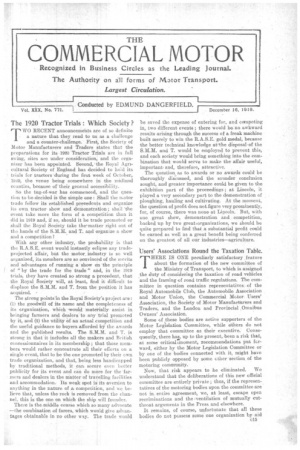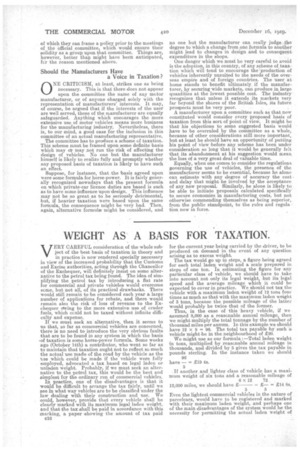The 1920 Tractor Trials : Which Society ?
Page 1

Page 2

If you've noticed an error in this article please click here to report it so we can fix it.
TWO RECENT announcements are of so definite . a nature that they read to us as & challenge and a counter-challenge. First, the Society of Motor Manufacturers and Traders states that the preparations for its -1920 'Tractor Trials are in full swing, sites are under consideration, and the organizer has been appointed. Second, the Royal Agricultural Society of England has decided to hold its trials for tractors 'during the first week of October, 1920, the venue being somewhere in the midland counties, because of 'their. general aocessibility.
So the tug-of-war has commenced, and the question to be decided ii3 the simple one: Shall the motor trade follow its established preeedents and organize its own tractor show and demonstration-;' shall th.e event take more the form of a competition than it did in 1919 and, if so, should it be trade promoted or shall the Royal Sogiety take thematicr right out of the hands of the S.M.M. and T. and organize a show and a competition?
With any other industry, the probability is that the R.A.S.E. event would instantly eclipse any tradeprojected affair, but the motor_ industry is so well organized, its members are so convinced of the merits and 'advantages of running a show on the principle of `-` by the trade for the trade" and, in the 1919 trials, they have created so strong a precedent, that the Royal Society will, at least, find it difficult to displace the S.M.M. and T. from the position it has acquired. , The strong points in the Royal Society's project. are: (1) the goodwill of its name and the completeness of its -organization, which would materially assist in bringing farmers and dealers to any trial promoted by it, and (2) the utility of an actual competition and the useful guidance to buyers afforded loY the awards and the published results. The S.M.M. and T. is strong in that it includes all the makers and British concessionnaires in its membership ; that those members would rather concentrate all their efforts on a single event, that to be the one promoted by their own trade organization, and that, being less handicapped by traditional methods, it can. secure .even better publicity for itt event and can do more for the .farIners and dealers in the matter of travelling facilities and accommodation. Its weak spot is its aversion to anything in the nature of a competition, and we believe, that, unless the rock is removed from the channel, this is the one on which the ship will founder.
There is the .middle course which so many advocate —the combination of forces, which would give advantages obtainable in no other way. The trade would be saved the expense of entering for, and .ccanpeting in, two different events ; there -would be. no. awkward results arising through the success of a. freak machine built merely to win the R.A.S.E. gold medal, because the better teehniCal knowledge atothe disposal of the S.M.M. and T. would be employed to prevent this, and each society would bring something into the combination that would serve to make the affair useful, important, and, therefore, attractive.
The question. as to awards or no awards could be thoroughly discussed, and the sounder conclusion sought, and greater importance could be given to the exhibition part of the proceedings; at -Lincoln, it played a very secOndary part to the demonstration of ploughing, hauling and cultivating. At the moment, the question of profit does notfigure very prominently, for, of course, there was none at Liocoln. But, with one great show, demonstration and competition, backed 'up by two great:organizations, we should be quite prepared to find that .a substantial profit could be earned as well as a great benefit being conferred on the greatest of all our industries—agriculture.
Users' Associations Round the Taxation Table.
THERE IS ONE peculiarly satisfactory .feature about the formation of the new committee of the Ministry of Transport, to which is assigned the duty of .considering the taxat-ion of road vehicles and the framing of road traffic regulations. The committee in question contains representatives of the Royal Auto-mobile Club, the Automobile. Association and Motor Union, the Commercial Motor Users' Association, the. Society of Motor Manufacturers and Traders, and the London and Provincial ,Omnibus Owners' Association.
Some eif these bodies are active supporters of tho Motor Legislation Committee, while Others do not employ that committee as their executive. Consequently, there hag, up to the present, been a risk that, at some criticaliraoment, recommendations put forward, either by the Motor Legislation Committee or by one of the bodies connected with it, might have been publicly opposed by some ether -section, of the motoring community.
Now, that .risk appears to be eliminated. We understand that the deliberations of this new official committee are entirely private ; -thus, if the representatives of the motoring bodies upon the committee are not in. entire agreement, we, at least, escape open recriminations and the :ventilation of mutually cutthroat arguments in the Press and elsewhere.
It remains, of course, unfortunate that all these bodies do not possess some one organization by aid of which they can frame a, policy prior to the meetings of the official committee, which would ensure their solidity as a group upon that committee. Things axe, however, better than might have been anticipated, for the reason mentioned above.
Should the Manufacturers Have a Voice in Taxation ?
ONE CRITICISM, at least, strikes one as being necessary. This is that there does not appear upon the committee the name of any motor manufacturer, or of anyone charged solely with the representation of manufacturers' interests. It may, of course, be argued that if the interests of the user are well served, those of the manufacturer are equally safeguarded. Anything -which encourages the more extensive -use of motor vehicles means more business for the manufacturing industry. Nevertheless, there is, to our mind, a good case for the inclusion in this committee of an actual manufacturing representative.
The committee has to produce a scheme of taxation. This scheme must be framed upon some definite basis which may almay not run the risk of affecting the design of vehicles. No one but the manufacturer himself is likely to realize fully and promptly whether anyproposed basis of taxation is likely to have such an effect.
Suppose, for instance, that the basis agreed upon were some formula for horse-power. It is fairly generally recognized nowadays that the present formula on which private-car licence duties are based is such as to have some influence upon design. This influence may not be so great as to be seriously detrimental, but, if heavier taxation were based upon the same formula the consequence might be very bad. Then, again, alternative formuhe might be conslaered, and no one but the manufacturer can really judge _the degree to which a change from one formula to another Might lead to changes in design and to conseqnent expenditure in the shops.
One danger which we must be very careful to avoid is the adoption, in this country, of any scheme of taxation which will tend to encourage the production of vehicles inherently unsuited to the needs of the overseas empire and of foreign countries. The user at home stands to benefit ultimately. if the manufacturer, by securing wide markets, can produce in large quantities at the lowest possible cost. The industry recognizes that unless it extends its markets very far beyond the shores of the British Isles, its future prospects must be very poor. A manufacturer upon a committee such as that now constituted would consider every proposed basis of taxation from this sort of point of view. It might be that his objections to some suggested basis would have to be overruled by the committee as a whole, because of other considerations still more important, but at least he should have an opportunity of putting his point of view before any scheme has been under consideration so long that it would be generally felt that its abandonment at his suggestion would mean the loss of a very great deal of valuable time.
Equally, when one comes to consider the regulations governing the use of vehicles, the presence of the manufacturer seems to be essential, because he alone can estimate with any degree of accuracy the cost and delay that might be involved by the acceptance of any new proposal. Similarly, he alone is likely to be able to initiate proposals calculated specifically to secure economies in manufacturing costs, but not otherwise commending themselves as being superior, from the public standpoint, to the rules and regula • tion now in force.


























